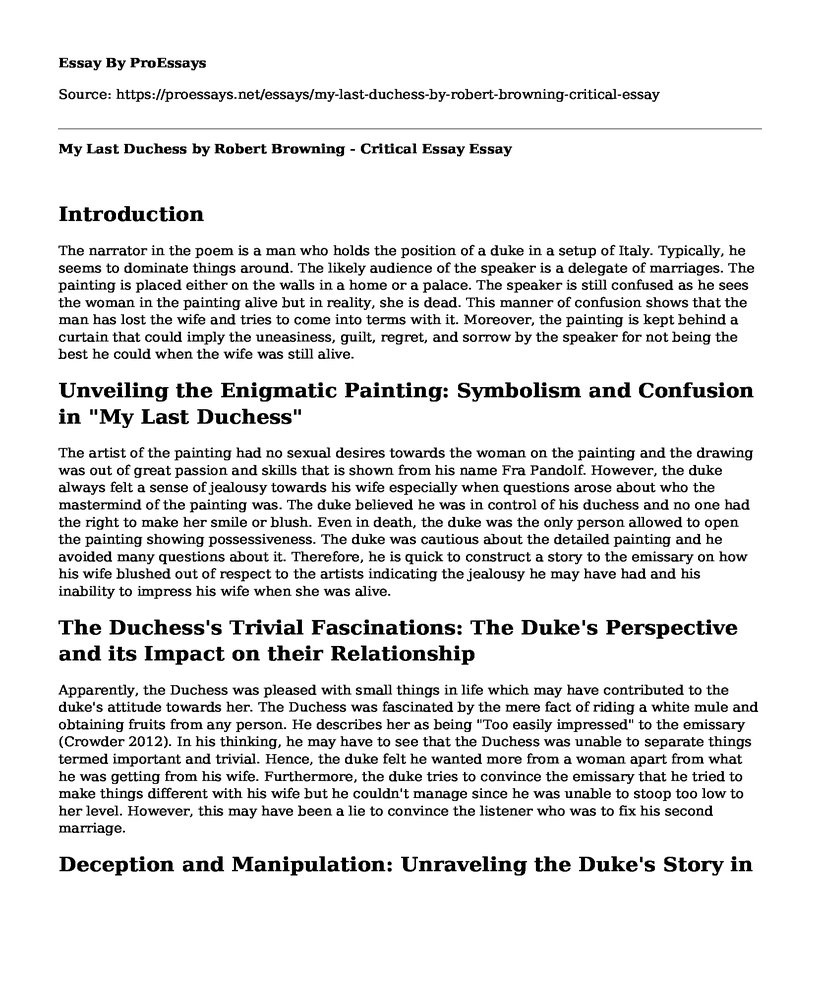Introduction
The narrator in the poem is a man who holds the position of a duke in a setup of Italy. Typically, he seems to dominate things around. The likely audience of the speaker is a delegate of marriages. The painting is placed either on the walls in a home or a palace. The speaker is still confused as he sees the woman in the painting alive but in reality, she is dead. This manner of confusion shows that the man has lost the wife and tries to come into terms with it. Moreover, the painting is kept behind a curtain that could imply the uneasiness, guilt, regret, and sorrow by the speaker for not being the best he could when the wife was still alive.
Unveiling the Enigmatic Painting: Symbolism and Confusion in "My Last Duchess"
The artist of the painting had no sexual desires towards the woman on the painting and the drawing was out of great passion and skills that is shown from his name Fra Pandolf. However, the duke always felt a sense of jealousy towards his wife especially when questions arose about who the mastermind of the painting was. The duke believed he was in control of his duchess and no one had the right to make her smile or blush. Even in death, the duke was the only person allowed to open the painting showing possessiveness. The duke was cautious about the detailed painting and he avoided many questions about it. Therefore, he is quick to construct a story to the emissary on how his wife blushed out of respect to the artists indicating the jealousy he may have had and his inability to impress his wife when she was alive.
The Duchess's Trivial Fascinations: The Duke's Perspective and its Impact on their Relationship
Apparently, the Duchess was pleased with small things in life which may have contributed to the duke's attitude towards her. The Duchess was fascinated by the mere fact of riding a white mule and obtaining fruits from any person. He describes her as being "Too easily impressed" to the emissary (Crowder 2012). In his thinking, he may have to see that the Duchess was unable to separate things termed important and trivial. Hence, the duke felt he wanted more from a woman apart from what he was getting from his wife. Furthermore, the duke tries to convince the emissary that he tried to make things different with his wife but he couldn't manage since he was unable to stoop too low to her level. However, this may have been a lie to convince the listener who was to fix his second marriage.
Deception and Manipulation: Unraveling the Duke's Story in "My Last Duchess"
Indeed, the ability of the duke stopping the duchess smile in the portrait indicates that he could have a hand in her death. Duke's main interest in the second marriage is wealth and he aims at getting Count's daughter who has the highest count. This is also portrayed when the duke mentions Claus Innsbruck name (Crowder 2012). Generally, the absence of the duchess could be attributed to the pretentious nature of the duke which may have resulted into her death out of sorrow.
Commentary
My Last Duchess is a piece that was written in the town of Italy in 1842. The piece is presented in a poetic form. It is presented in the form of iambic pentameter which gives it a rhythmic beat on creating the plot and portraying the message. The speaker uses the duchess to symbolize his wife who has long been dead. The wife is portrayed as "too easily impressed" (Crowder 2012) persona by the speaker which could be the reason why the speaker despises her in some way. My approach relates to the readings in that it tries to analyze the poem and telling the story in a different and more understandable form. From my writing, I try to give the true meaning of the poem as a whole and try to solve the mystery of how the portrait came to be and the death of the duchess.
Cite this page
My Last Duchess by Robert Browning - Critical Essay. (2022, Jul 21). Retrieved from https://proessays.net/essays/my-last-duchess-by-robert-browning-critical-essay
If you are the original author of this essay and no longer wish to have it published on the ProEssays website, please click below to request its removal:
- Literary Essay - The Stylistic Devices Used to Present the Theme of Paralysis in Joyce's Dubliners
- Critical Essay on Similarities between Antigone in "Antigone" and Nora in "A Doll's House"
- Essay on Danger for Odysseus
- Literary Analysis Essay on Birthmark by Nathaniel Hawthorne
- Essay Sample on Gender in 'Taming of the Shrew'
- Paper Example on the Evil and Uncivilized European in the Jungle of Africa ''Heart of Darkness"
- Essay on Hard Times: Sissy's Humble Journey of Kindness and Compassion







